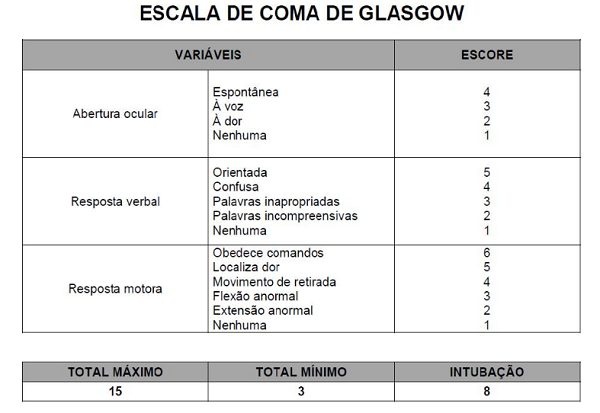The Glasgow scale, also known as the Glasgow Coma Scale (ECG) is a neurological scale capable of measure and assess the level of consciousness of a person who has suffered a head injury.
This scale is a very reliable method for detecting a person's level of consciousness after accidents. It is used during the first 24 hours after trauma and is evaluated based on three parameters: eye opening, motor response and verbal response.
Its assessment is also used as a resource for health professionals in the patient's prognosis, in addition to being very useful in predicting possible sequelae.
Initially, the scale was created in 1974 by Graham Teasdale and Bryan J. Jennett from the Glasgow Institute of Neurological Sciences (UK). The proposal was to develop a method to measure the levels of neurological damage in patients, thus determining the appropriate treatment.
More recently, it has this classification of assistance in the analysis of the level of consciousness.
know more about Prognosis.
How the Glasgow Scale Works
The Glasgow scale will only be used after the occurrence of a traumatic brain injury, injury caused by a severe blow to the skull. The most frequent symptoms are headache, drowsiness and seizures.
After the trauma, the healthcare professional will evaluate the patient and according to the answer that he will give, a specific value will be assigned for each type of reaction, according to the table bellow:

For example, when analyzing how the patient opens his eyes, the score can be from 1 to 4, where the smallest corresponds to the smallest signal of the patient's response and the largest to the immediate response.
After these assessments, the sum of the three parameters evaluated is made, where the lowest value that can be obtained on the Glasgow scale is 3 points and the highest is 15 points, where:
- The rating that varies from 3 to 8 points it is considered serious, having the need to immediate intubation;
- The classification of 9 to 12 points it is considered moderate;
- The classification of 13 to 15 it is considered Light.
The lower the score recorded on the patient, the more serious the situation. In fact, if the score is 3 points, it means that the patient is in a deep coma, representing more than an 80% chance of dying.
Updated Glasgow Scale
Recently, some modifications were made to the Glasgow scale, with the aim of optimizing its use in the patient assessment process.
In the updated scale, the assessment steps are clearer, with a greater emphasis on individual scores than on the sum total.
Another aspect regarding the updated scale is that when the patient has some characteristic that make the analysis difficult, the health professional must inform that the use of the scale is not applicable. That is, no score is given.
